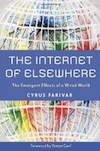Book: The Internet of Elsewhere
by Cyrus Farivar
Rutgers University Press
May 2011
Abstract
Through the lens of culture, The Internet of Elsewhere looks at the role of the Internet as a catalyst in transforming communications, politics, and economics. Cyrus Farivar explores the Internet’s history and effects in four distinct and, to some, surprising societies–Iran, Estonia, South Korea, and Senegal. He profiles Web pioneers in these countries and, at the same time, surveys the environments in which they each work. After all, contends Farivar, despite California’s great success in creating the Internet and spawning companies like Apple and Google, in some areas the United States is still years behind other nations.
Skype was invented in Estonia–the same country that developed a digital ID system and e-voting;Iran was the first country in the world to arrest a blogger, in 2003; South Korea is the most wired country on the planet, with faster and less expensive broadband than anywhere in the United States; Senegal may be one of sub-Saharan Africa’s best chances for greater Internet access.
The Internet of Elsewhere brings forth a new complex and modern understanding of how the Internet spreads globally, with both good and bad effects.
Review by Curt Hopkins in ReadWriteWeb
“Instead of focusing on the capital of the Web, Silicon Valley, or even on one of the Silicon Valleys outside of the original, like Bangalore, India, Farivar has taken a look at our wired world through the lenses of South Korea, Senegal, Estonia and Iran.
There is a tendency to think of the Internet as being a priori and sui generis. This is a new world so powerful and so game-changing that it effects history and culture, no matter where one stands. Farivar’s argument, and it is a well-made one, is that like any other element of the human experience, the Internet is effected by history and culture. If we ignore that fact, if we let ourselves believe that the Internet, not history, is more of a determining factor in our future, we are liable to be surprised by it to an excessive degree.
Each of the places he covers are important to our understanding of the Internet because their histories and cultures have influenced how they have embraced it. In a way, the countries he has chosen to profile are reflections of each other, Senegal of South Korea and Estonia of Iran.”




